Full-time RV living is a lifestyle choice that has become more and more popular in recent years. It offers the freedom to travel and explore new places, visit friends & family (and make new friends), live a minimalist life, escape the confines of traditional homeownership, and see places and things we’d have never seen otherwise. But many people don’t really understand the compelling nature of life on the road full-time, and we’ve read and heard many full-time RV myths that just don’t hold true from our perspective.
When we first hit the road full-time, we were brand new first-time RV owners who set out to travel living on the road in a motorhome for a couple of years. 20 years later we found ourselves still living the full-time RV life, having traveled throughout all of North America and even several RV trips abroad. We’ve also written hundreds of blog posts about full-time RV living and created hundreds of YouTube videos.
So, we’d say we’ve got reasonable street cred to debunk many of the full-time RV myths we hear about, and that’s what we hope to do in this post.
-
1)
What Are the Most Common Full-Time RV Myths?
- 1.1) RV Living Is Too Expensive
- 1.2) Full-time RV Living is Only For Retirees
- 1.3) You Can’t Full-Time If You Have Kids
- 1.4) An RV is an RV is an RV
- 1.5) You’ll Have no Privacy
- 1.6) You’ll Lack Social Connections
- 1.7) You Need to Be a Mechanic
- 1.8) You’ll Have to Give up Most of Your Possessions
- 1.9) Your Friends & Family Will Think You’re Crazy
- 1.10) You Can’t Work
- 1.11) You’ll Be Bored
- 1.12) Living In an RV Isn’t Safe
- 1.13) RVs Are Too Small for Full-Time Living
- 1.14) You’re Forced to Be Constantly On the Move
- 1.15) You Can’t Have Pets
- 1.16) You Can’t Earn a Stable Income
- 1.17) You Can’t Get Mail When Living On the Road
- 1.18) You’ll Miss Out on Culture and the Arts
- 1.19) You’re Always Either In a Campground or a Walmart Parking Lot
- 1.20) You’ll Be Lonely Out There
- 1.21) You Can’t Have a Garden in an RV
- 1.22) It’s Hard to Find Campsites
- 1.23) RVing is an Environmentally Unfriendly Lifestyle Choice
- 1.24) It’s Cheaper to Live In an RV
- 1.25) Moving to the RV Lifestyle Will Solve All Your Problems
- 1.26) It’s Easy to Find Campsites
- 1.27) Buying a NEW RV Means You’ll Have No Repairs to Worry About
- 1.28) It’s Easy to Establish a Domicile/Permanent Address
- 1.29) With Remote Work Available, It’s Easy to Earn a Stable Income
- 1.30) You’re Always on Vacation
- 1.31) Finding Wi-Fi Is Easy
- 1.32) You Can Always Travel to Places With Perfect Weather
- 1.33) It’s Easy to Stop Doing It!
- 2) Free RVing Tips, Tricks, Reviews & Giveaways
What Are the Most Common Full-Time RV Myths?
There are many myths about full-time RV living. Following are 33 of the most common misconceptions we’ve heard along the way. There’s a little bit of overlap between some topics, but we tried to be as thorough as we could.
We’ll start by debunking some “negative” myths, that is, misconceptions that focus on the negatives many people think you’re bound to encounter when living in an RV full-time. (There are two sides to some of these coins, and in those cases, we’ll get to debunking the opposing side in the second half of the post.)
Common Negative Full-Time RV Myths
Let’s take a look at some common myths about full-time RV living that are negative but aren’t always true.
RV Living Is Too Expensive
While the initial cost of buying an RV and maintaining it can be high (which is true now matter HOW you’re going about living the RV lifestyle!), full-time RV living can be cost-effective in the long run, especially if you minimize your expenses. In the end, this one really depends on how you intend to live and travel.
The type of RV you want or need to make the lifestyle work for you is a big factor here. For instance, travel trailers and fifth wheels are less expensive to buy and maintain than large Class A motorhomes, but you’ll also need to consider the cost of buying and maintaining the vehicle that’ll pull your rig along the open road.
As for living, RV parks aren’t cheap, but there are many places where you can camp for free. Boondocking and/or moochdocking make the RV lifestyle much cheaper. (See 27 of our best boondocking tips!)
How much you drive (fuel costs) factors in here as well, (but here are five great apps to find cheap gas/fuel.)
You’re also likely to save money on utilities, property taxes, and the costs associated with maintaining a typical house. Considering the overall cost of owning a traditional sticks & bricks home, it’s easy to spend less on RVing… and that’s even taking RV depreciation into account. We’ve spent far less on annual living expenses over the past 20 years than we ever did in a fixed-location house.
Full-time RV Living is Only For Retirees
Full-timing isn’t exclusive to retirees by any stretch, and we’re a great example of this. While we initially planned to live the full-time RV life for just a couple of years, we soon realized that we weren’t ready to go back to living in a fixed location. But we weren’t anywhere near the age (or bank account level) of retirement. We had to find a way to earn a steady income while living on the road.
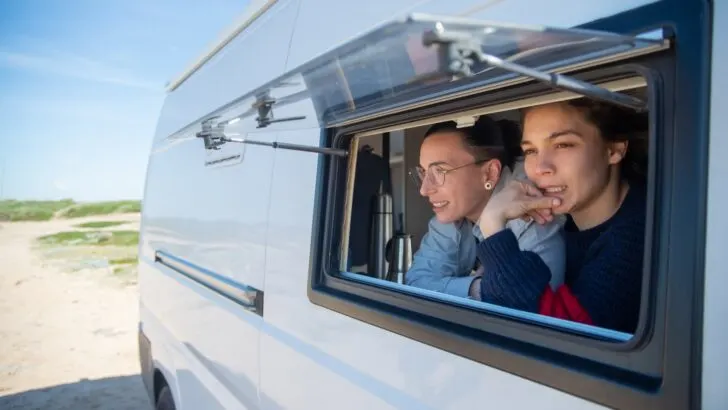
RVing used to be a lifestyle associated with retirees, but that’s no longer the case. We’ve met RVers of all ages in our travels. In recent years, full-time RV living has become much more common for people of working age.
People of all ages, including families and digital nomads, are embracing the full-time RV lifestyle. And luckily, technology has made working remotely more available than ever. Being able to get online through the use of cellular boosters, and now Starlink, has been a game changer.
To put into perspective how much things have changed from a connectivity standpoint (and how long ago we hit the road), the day we drove away from our last sticks & bricks house for the final time (April 11, 2003), it would still be more than four years until the release of the original iPhone!
You Can’t Full-Time If You Have Kids
Full-time RV living can be a rewarding experience for families, offering unique educational and bonding opportunities.
Many families are embracing the opportunity to expose children to a range of benefits associated with traveling such as living in new places, meeting new people, and learning about different cultures.
If your children are of school age, roadschooling is an absolute possibility and one that many families find to have benefits over traditional schooling.
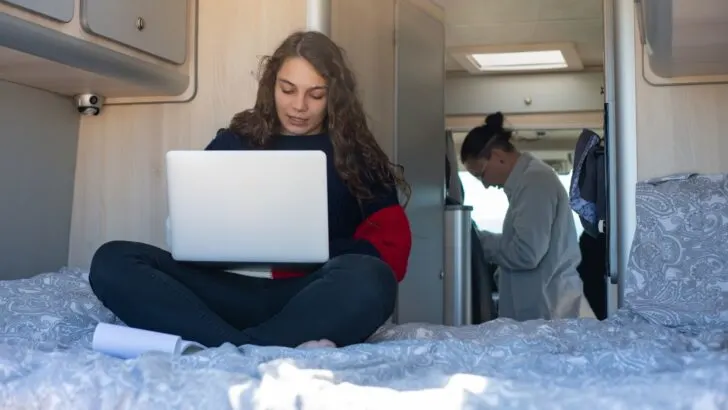
Roadschooling has become more and more popular. Young students can complete their studies online while benefitting from an education that only travel and exposure to new places and cultures can provide.
Our friends Heath & Alyssa Padgett are traveling all over the world with their little ones, Ellie and Eli, and are a great example of how you can absolutely travel far and wide if you have children. They’ve gone from full-time RVing to splitting their time between Airbnb-type lodging and rental RVs all over the world.
An RV is an RV is an RV
Another myth is that RVs are all basically the same, but that’s far from true. First, you can buy a new or used RV.
Also, RVs come in various types, from tiny teardrops to Class B and Class B+ RVs, to Class C’s, travel trailers and 5th wheels, to luxurious Class A RVs and big rigs.
There’s a good chance there’s an RV to suit your particular needs, preferences, and budget.
You’ll Have no Privacy
RV parks offer a sense of community that many people enjoy, but you can also find solitude and privacy if/when that’s your preference. We’re a great example of this because boondocking is our favorite way to RV. We’ve camped for extended periods in remote locations where there’s been no one (other than coyotes) for miles around.
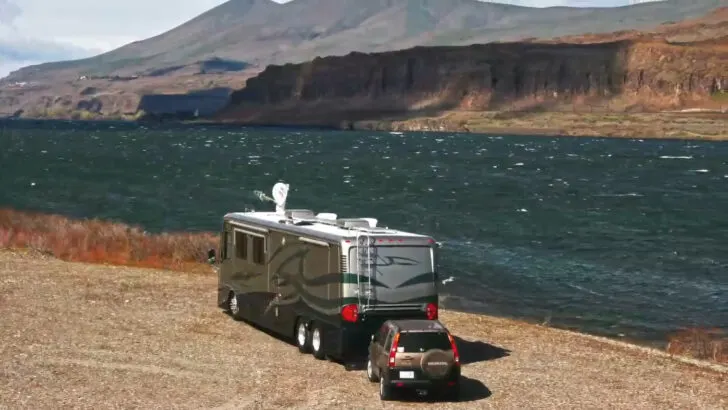
In this awesome boondocking spot, our only neighbors were the river and the mountains.
How about here?
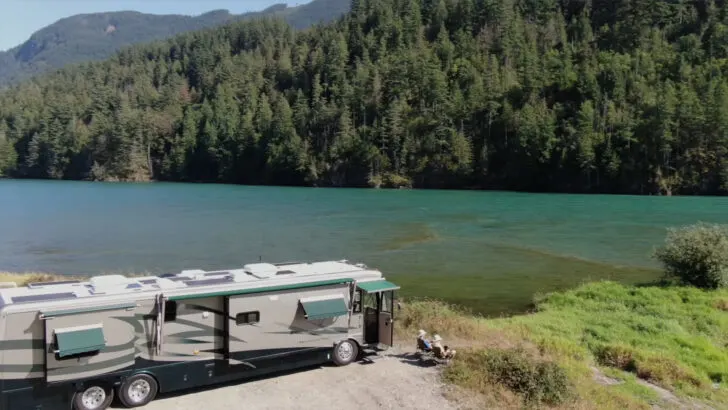
In this boondocking location, we were all alone with the gorgeous scenery.
Get a sense of privacy here?
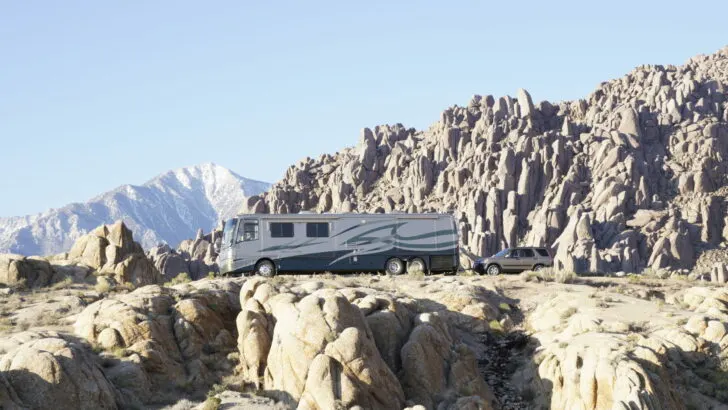
This scenery may be rocky, but it was just as remote and beautiful as anywhere we’ve camped.
How about here?
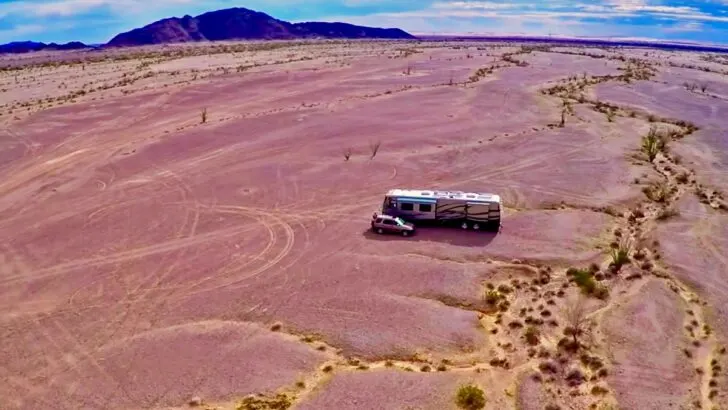
Here we’re boondocking in the open desert with no neighbors for many miles.
It’s hard to resist sharing some of the magnificent places we’ve stayed, but okay… myth busted. On to the next one!
RV communities are known for their strong social bonds, and you can easily meet like-minded people on the road.
One great way to meet fellow RVers is to join a group like Escapees RV Club /Xscapers. If you’re traveling with your family, a group like Fulltime Families might be a great way to make social connections for you and your kids.
You can also join homeschooling groups. There are lots of homeschooling families who may not live in an RV but love to take their kids on road trips and look forward to meeting other homeschooling families.
Escapees and Xscapers offer lots of great benefits, and if you decide to join, you can save yourself some cash by using our RVgeeks coupon (we donate 100% of our proceeds from their affiliate program to the Escapees CARE center).
The Escapees RV Club is one of the oldest, largest, and most loved RV membership organizations in the world. They provide a total support network for all RVers, regardless of their travel style...Show More
The Escapees RV Club is one of the oldest, largest, and most loved RV membership organizations in the world. They provide a total support network for all RVers, regardless of their travel style, type of RV, or experience level.
We're particularly drawn to the Xscapers group, which is a community within the Escapees RV Club that was created specifically for working-aged RVers.
All in all, Escapees membership offers a lot of valuable resources… and, if you join using our link, we’re donating 100% of our affiliate proceeds to the Escapees C.A.R.E Center, a 501(c)(3) nonprofit corporation that provides a safe haven (with professional assistance at affordable prices) for members whose travels are permanently ended because of age, or temporarily interrupted because of health problems.
So if you're not already a member, please join today!
Show LessHere we are at the 2020 Xscapers Annual Bash in Lake Havasu City, AZ, filming a segment for The RVers in a big tent full of fellow RVing friends:
You Need to Be a Mechanic
While basic RV maintenance knowledge is helpful, you don’t have to be a mechanic to own an RV. Many repairs can be outsourced to professionals, just like with any home. But many minor repairs, tweaks, and adjustments can be made by almost anyone.
As may be obvious from our RVgeeks blog and our YouTube channel, we’re big DIYers, but there are certain things we leave to the pros. We do suggest becoming as familiar as possible with regular RV maintenance tasks and learning as much as you can about your own rig.
You’ll Have to Give up Most of Your Possessions
When moving into an RV full-time, you’ll certainly need to downsize to move into such a small space. The size of your RV will determine how much you can carry with you, but most people quickly realize that they brought more along with them than they really need.
Many people who try out full-time RV living rent storage spaces where they store many things from their home that they think they may want in the future or in the event that they eventually decide to quit RVing. And many end up finding that they never use the stored items again.
If you have sentimental items that are meaningful to you but that you don’t have room to carry, consider putting them in a plastic storage bin and asking a friend or family member to hang on to the bin for you. (That’s what we did.)
- Construction grade container
- Stackable tuff storage container
Your Friends & Family Will Think You’re Crazy
This may actually be true in some cases initially, but over time, friends & family will likely become supportive of your choice (and maybe even a bit envious that you’re actually doing what many people only dream of).
When we first hit the road, friends & family sometimes jokingly referred to us as “hobos” or “trailer trash” (we did too). Once they saw the amazing life we were living, most wanted to come visit us at every opportunity. And many of them openly expressed wonder at the great life we’d created for ourselves by following such an unorthodox path.
You Can’t Work
Similar to #2 above, many people think that full-timing isn’t feasible for working-age people. But modern technology makes remote work increasingly accessible and there are many jobs you can do from the comfort of your RV. There are also in-person jobs that you can find along the way, which is how many nomads earn the money to continue their travels.
Really, though, there has never been a time when working remotely has been more available. Workamping, remote work, starting your own business, and monetizing a blog and/or YouTube channel are just a few ideas to consider. Many major companies hire people to work remotely as well. That’s become more available than ever due to the Covid pandemic, since companies got more used to remote work during that time.
We spent our first few years on the road living modestly off savings. When we decided to continue full-timing, we knew we had to find a way to make a living while traveling. We’ve run several businesses from the road for the past couple of decades, and that was before remote work became more the norm, as it is now. (There are still some challenges, and we’ll discuss those shortly.)
You’ll Be Bored
Bored? This might be the craziest full-time RV myth of all. The world is vast, and there’s an abundance of things to see and do everywhere. We’re never bored, no matter where we are.
Exploring, hiking, biking, kayaking, sightseeing, working, reading, enjoying music, learning, visiting national and state parks, and taking care of the rig will keep anyone far too busy to ever be bored. And all in any location you happen to be in the mood for!
Living In an RV Isn’t Safe
Living in an RV is no less safe than living in any home, as long as you take reasonable precautions and practice common-sense safety measures.
The details may be a bit different in an RV where you’re dealing with things like propane, proper tire inflation, driving a large rig, towing, etc., but knowing how to properly manage the various components of your home and your surroundings is the best way to stay safe whether you’re in an RV or not.
As far as personal safety and security, we’ve been asked many times about feeling afraid when we’re out alone in the middle of nowhere. We always respond that it’s people that might be a cause for concern in some cases, and being where there are no people is super relaxing.
Now we get it that we’re two guys, both over 6′ tall, and pretty confident in our ability to take care of ourselves. We absolutely understand that others (maybe an older couple or a solo female RVer, for example), may feel less secure being alone in an unfamiliar environment. In those cases, the comfort of an RV park, with fellow RVers all around, might feel more secure.
RVs Are Too Small for Full-Time Living
RV layouts vary widely, and most are designed with space optimization in mind. You can find models that offer comfortable living spaces that serve your particular situation. We always advise the three most important things to consider when choosing an RV are floorplan, floorplan, floorplan!
If you’re traveling with a family, there are fifth-wheel RVs that are so large that you’ll rarely run into each other. (Okay, that’s an exaggeration.) There are RVs with bunk beds for the kids and lots of rigs with outside kitchens and entertainment centers.
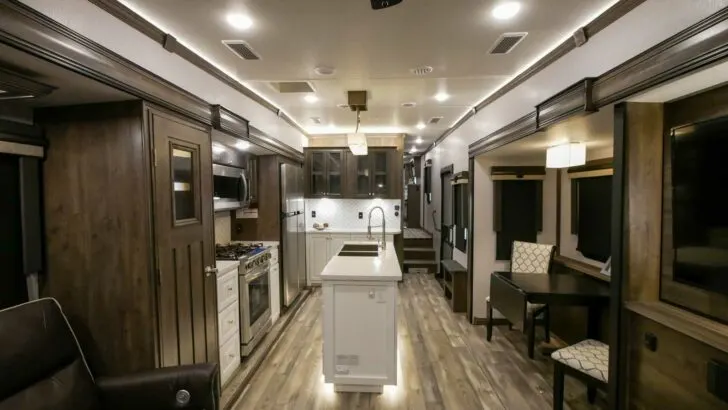
Some RVs, like this Forest River Cardinal 5th wheel, are not only luxurious but very expansive. (Photo Source: Forest River RV, Inc.)
Remember, too, that many RVers enjoy being outdoors and consider their “living room” the vast area outside their RV. The smaller your RV is, the more you’re likely to want to extend your living space to the outdoors, living out of your rig more than in it.
There are many ways to do this, including (but not limited to) RV awning screen rooms and regular screen tents for campers, as well as gear like rocking camping chairs, folding camping tables, portable campfires, and propane fire pits.
You’re Forced to Be Constantly On the Move
You can travel as much or as little as you want when you’re living full-time in an RV. Many RVers choose to stay in one place for extended periods, allowing for a more stable and relaxing lifestyle, while others prefer to be on the go as much as possible.
Some full-timers spend several months in a long-term campground and travel during the other months. Others go from place to place, staying for a couple of weeks or more in each location.
You Can’t Have Pets
Many RVers travel with their pets and find RVing very accommodating for their fur babies. This does depend on the pet, the RV, and the weather where you tend to travel. Pets may require special considerations to keep them safe. For example, a dog that gets loose won’t know where “home” is.
But that’s why there are RV pet monitors, RV pet fences, and even RV dog ramps for the older pups. There are even pet-friendly RV rentals, so it’s possible to travel in an RV with pets if you don’t already own one (an RV that is… not a pet… we cannot condone dog-napping).

Many RVers travel with pets. You simply need to make sure that your lifestyle doesn’t interfere with their safety, and there are many options for helping to keep them safe and comfortable.
You Can’t Earn a Stable Income
As a follow-up to #10, we’re talking about establishing a secure, long-term income. While you may need to figure out how you’re going to earn money while you’re living on the road, how sustainable is it?
We’ve been earning a stable living on the road for over 16 years (our first four years were living extra-frugally off savings). We started by creating RVgeeks Website Design, where we designed and managed websites exclusively for RV parks. We recently sold that business to fellow RVing friends, and it’s been rebranded as RVParkWebsites.com. They still service all the websites we created over the years, and are designing more all the time.
Many of our full-time RVing friends do the same — create stable, long-term, location-independent businesses. (And in some cases they sell them, too!) With remote work, freelancing, and various income streams available, maintaining a steady income is absolutely possible. Although it does require work (like anything else), perseverance, and a little ingenuity.
You Can’t Get Mail When Living On the Road
Sure you can! There are RV mail forwarding services that make receiving mail and packages on the road entirely possible. We use a mail service that scans each envelope we receive and emails us the image.
With the click of a button, we can request that they “open & scan” an envelope’s contents for us to see, shred or recycle it, or physically forward it to any address we specify (including General Delivery to any US Post office). It’s fantastic not having to worry about receiving snail mail no matter where we are.
You’ll Miss Out on Culture and the Arts
Au contraire mes amis! RV living allows you to explore a diverse range of culture, art, music, and cultural experiences in various places all over the world *. It’s actually a great way to increase your exposure to arts and culture.
* We’ve rented RVs overseas on five international RV trips (so far), visiting Italy, England, France, Switzerland, Spain, Australia, and New Zealand, often for over a month at a time. On more than one occasion, we’ve planned a trip to specifically include concerts we were eager to attend (ELO in London, anyone?) The availability of cultural opportunities in so many countries is huge!
You’re Always Either In a Campground or a Walmart Parking Lot
See our boondocking photos above to dispel this myth.
Sure, we’ve stayed in lots of campgrounds, RV parks, rest areas, Wal-Marts, Cabelas, and other parking lots over the past couple of decades. But those have never been our first choice of RV lifestyle/camping spots. When living in an RV full-time, you can choose your travel destinations to match your interests, whether it’s in or near the city, at the beach, or in the mountains or the desert.
The bottom line on this is that there are so many varied options for where to camp that it’s hard to get stuck using any one type of location. Learning to become a good boondocker is the #1 way to increase your options. That includes equipping your rig for off-grid use, and practicing water- and power-saving techniques.
You’ll Be Lonely Out There
As a follow-up to #6 above, we want to talk about more than just the “RV community.”
As mentioned, RVers often find a sense of community and friendship among fellow RVers. You can be as alone or as social as you choose. There’s lots of community to be found in RV parks, at festivals, in state & national parks, at events, and through groups that hold rallies like those associated with your particular RV or general RV groups like Escapees/Xscapers.
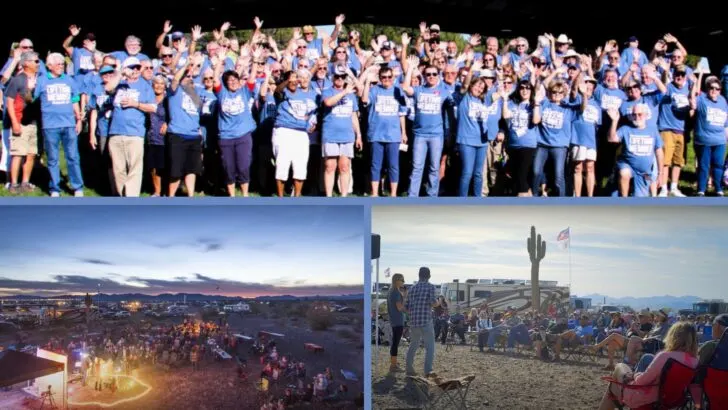
Joining an RV club like Escapees/Xscapers or any other RV travel club (and there are many!) is a great way to meet people and enjoy rallies and other social events.
But there’s also a related topic we don’t hear mentioned as often — the fact that living a nomadic life brings you to far more places than the average person visits. For example, we lived (and of course worked) on the East Coast before we hit the road full-time. But just like most people, we have friends and family all over the place.
Work considerations make it harder to find time to travel to see each other, making visits rarer for those living and working in a fixed location. Since we hit the road, our friends and family in places like Florida, Ohio, Michigan, Colorado, South Dakota, and California know they’ll get to see us any time we’re in their area. We see them far more often than we did before.
And we bring our own bedroom and bathroom with us, making us awesome guests! (Even with our big rig, we’ve slept comfortably in the street in front of a friend’s house more times than we can count.)
And of course, our RV has become a highly desirable destination for friends and family to come visit. We’ve been able to share amazing places like Yosemite, Zion, Arches, and Canyonlands National Parks, as well as lots of other wonderful locations.
You Can’t Have a Garden in an RV
Many RVers create beautiful potted gardens that travel with them. Even people traveling in a small van or a Class B rig can grow herb gardens. When our friends Jason & Nikki Wynn were RVing (before they moved to a boat), Nikki grew herbs on board in small pots and cut them fresh for use in her fantastic meals (Nikki is an amazing cook, which we experienced in depth when we sailed their catamaran through the Panama Canal with them exactly 6 years ago this month).
It’s Hard to Find Campsites
We’ll cover both sides of this coin (#26, below), but these days, there are so many apps and websites that are helpful that it’s easier than ever to find a campsite when you need one. Of course the smaller your rig, the easier it is to park just about anywhere. But even if you’ve got a big rig, you can check out our post on how to find big rig RV parks.)
Here are the 7 best free camping apps for the avid boondocker, as well as how to find free overnight RV parking. You can also use a campsite availability checker if you’re looking for a commercial campground or RV park.
RVing is an Environmentally Unfriendly Lifestyle Choice
Many people think this because they jump to the “use of fuel” argument as making RVing bad for the environment. But RVs can be as eco-friendly as houses and even more so, especially when conscientious RVers practice sustainability on the road. It’s all about the overall environmental footprint.
For example, we tend to use far less water than people living in sticks & bricks houses, especially when we’re boondocking or in transit. We also use far less electricity and fewer resources in general. In fact, fewer resources are used to manufacture and maintain an RV than a typical home, partly because of its much smaller size.
As far as fuel use goes, that of course depends a lot on the number of miles driven each year. After our first few years on the road, we think we probably evolved in a way that many other full-timers likely do as well. We began to feel as if we’d already seen and done so much, that we slowed our pace, and our routing. We began to drive far fewer miles each year than when we first started out.
The bottom line for us on this topic is that a conservation-minded person can easily use far fewer resources overall when living in an RV vs a typical fixed home. One of the most obvious examples of this is our water usage. We easily boondock for two full weeks without using up our 105-gallon fresh water tank supply. Most people probably use more water than that in a single day.
We also get nearly all the power our modest home needs from our 1,300-watt solar system. So our electric bill is usually the equivalent of zero in a regular house. How many people use so little power that they have no electric bill?
Also, heating our RV uses less energy for a couple of reasons. First, our house is so small (43′ may be large for an RV, but it would qualify as a (very) Tiny House if it were a regular home). Second, as winter snowbirds, we follow moderate weather, reducing the need for both heat and RV air conditioning.
Common Positive Full-Time RV Myths
Now let’s take a look at some common myths about full-time RV living that are positive but aren’t always true.
It’s Cheaper to Live In an RV
This may or may not be true depending on the RV you buy and how you choose to travel.
The initial purchase of an RV can be expensive, as can maintaining one. Even if you buy a used rig with a lower up-front cost, there are always repairs and ongoing maintenance to consider.
RV parks and even smaller campgrounds are expensive night after night. Many people want to always be connected to shore power, water, and other amenities, but the expense of staying in commercial campgrounds can add up quickly.
Monthly rates can help with this a lot. But for an RVer who wants to move fairly often, but still have full hook-ups, the overall cost will be higher. Frequent moves + full hook-ups at every stop = the most expensive way to RV.
Moving to the RV Lifestyle Will Solve All Your Problems
There are many people who are unhappy or unfulfilled in their lives who think that moving to the RV lifestyle will change all of that, and that’s not necessarily true. There are people who have difficulties with finances, relationships, work, and other aspects of life who simply carry those difficulties over to RVing. Living in a home on wheels to try to drive away from problems is unlikely to solve them.
It’s Easy to Find Campsites
Not to directly contradict our own point in #22 above, but there are two sides to this topic. Much of it depends on when and where (and in what size rig) you’re traveling. In many cases, finding campsites can be a bit of a challenge. It can also require some planning.
A good example for us is trying to visit friends or family in certain locations. For obvious reasons, that can be especially true in or near large cities, or during special events, or popular holiday periods.
But being full-time does allow us one really big advantage to help reduce the chances of getting shut out of a campsite. We always say that our favorite time to show up at a first-come, first-served campground (like in many National Parks, for example), is early on a weekday.
As a full-timer, there’s nothing better than seeing all the weekend warriors departing on a Monday around noon. That leaves us a great chance of getting a site, even in some of the most popular locations. Learning about these sorts of tricks is key to maximizing your ability to get a campsite.
That said, lots of the most desirable destinations have reservation-only campsites, making last-minute maneuvering of your arrival time ineffective. In these cases, other tricks such as using cancelled-campsite booking apps like CampNab or Arvie can provide a lot of help.
Unable to reserve a campsite? Now you can get notified when a sold-out campground has availability! Campnab helps campers around North America by monitoring a number of provincial, state, and...Show More
Unable to reserve a campsite? Now you can get notified when a sold-out campground has availability! Campnab helps campers around North America by monitoring a number of provincial, state, and federal parks in Canada and the United States.
You tell them when, where, and how long you want to camp for. They notify you (via SMS) when a suitable spot opens up at that campground—so you can nab that sold-out campsite reservation! We used it to book a site at Zion National Park's Watchman Campground... just 10 days before we were supposed to arrive there. In the peak of the season!
Show Less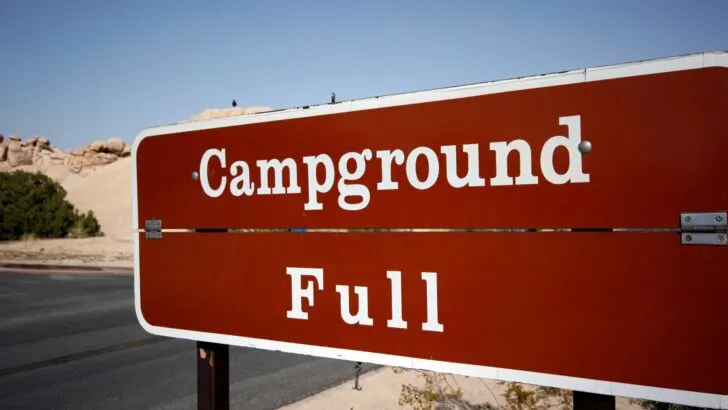
There are lots of resources to help RVers find campsites and other places to stay while they’re on the road, but it does require a bit of planning and it isn’t always easy.
Buying a NEW RV Means You’ll Have No Repairs to Worry About
This is a big myth. Even with a warranty. Many people buy a brand new RV so they won’t have to worry about repairs and things going wrong as they set about their new lifestyle. But brand-new RVs have problems, too. (Sometimes lots of problems.)
But if you think about it, buying a brand new house doesn’t mean that nothing will go wrong. Most new home construction requires a “punch list” of repairs in the first year or two. This is no different with an RV, which is, after all, a rolling home.
It’s Easy to Establish a Domicile/Permanent Address
Establishing a stable address for legal and administrative purposes is possible even as a full-time RVer, but it’s unlikely to be a simple process. Many people think that if you simply get a UPS address you’ll be all set. But there’s actually more to it, including tax ramifications, driver’s license renewals, RV/vehicle registrations, RV/vehicle insurance, health insurance, and more. Carefully choosing where to domicile is key to a successful launch into full-time RV life.
With Remote Work Available, It’s Easy to Earn a Stable Income
Money (specifically earning it) is a big topic. So this is the third time we’re touching on the subject here. We’re going to look at the flip side of #16, above. As we mentioned, the increase in opportunities for remote work definitely makes earning an income on the road more feasible, but that doesn’t mean it’s easy, or guaranteed.
It can take a while to figure out how you’re going to earn a steady income on the road unless you’re moving into full-time RVing with full-time remote work already in place.
So, if you’re planning to find remote work and/or start a mobile business/blog/YouTube channel, be sure you have a sizeable nest egg that can support you until your income grows enough to cover your expenses.
One of the biggest challenges for remote workers is the need for near-constant access to reliable internet service. It’s not as easy as tethering your computer to your phone with unlimited data. In fact, it’s almost never that simple. And if you think the answer to the question, “Is campground WiFi reliable?” is yes, think again!
We do have ideas to offer on how to boost the WiFi signal in RV parks, and you can also look into portable satellite internet options like Starlink. A lot of this will depend on where you travel. Despite advances in connectivity, a remote, forested location may very well leave you totally without internet access.
But technology is ever-changing and so are ways to have more dependable access to the Internet in more places. For more on this, have a look at our RV internet solutions (last updated in 2022), and check out our YouTube video explaining what was in our technology cabinet back in 2016.
You’re Always on Vacation
While you get to travel a lot, full-time RV living is not a perpetual vacation. It involves responsibilities and routine tasks like any other lifestyle. Of course, if you’re fully retired, with sizable assets and investments, you can ignore the having-to-earn-a-living part of the equation!
Finding Wi-Fi Is Easy
As we’ve noted above, many RV parks offer WiFi, but the reliability is less than stellar (okay… it’s downright useless in many cases.) You can invest in mobile hotspots and the like for improved connectivity, or in a satellite system like Starlink, but this involves an investment so you’ll want to plan on that. And even then, there are still places where internet access is simply not available. At all.
But those who think they can just work outside of a library or shop that has WiFi or work in a coffee shop every day are probably going to be disappointed. If you need consistent, reliable internet service, you’ll need to make an investment because finding WiFi is not easy.
You Can Always Travel to Places With Perfect Weather
Weather can be unpredictable, and no matter where you travel, you’re likely to experience all types of conditions. Being prepared for different weather is essential. That’s never been more true than the crazy weather conditions that so many of us have been experiencing over the past few years.
A couple of years ago, we were staying in one of our favorite hangouts for the summer — The Fraser Valley, surrounded by the mountains of British Columbia’s Lower Mainland. The highest temperature ever recorded there in over 100 years of record keeping was 99 F.
Notice we said that 99 “was” the highest temperature. While we were there, a heat wave hit, with several days in the 100’s. The hottest day clocked in at a scorching 113 F! And we were on a 30-amp hookup!
If not for our Micro-Air Easy Start A/C soft starters, which allowed us to run both air conditioners, we would have absolutely baked!) You just never know what to expect.
Run your A/C from a small, portable generator OR run two A/C units on a 30-amp connection. By reducing the start-up current needed to get your A/C compressor running, the EasyStart 364 keeps you...Show More
Run your A/C from a small, portable generator OR run two A/C units on a 30-amp connection. By reducing the start-up current needed to get your A/C compressor running, the EasyStart 364 keeps you cool!
Watch our EasyStart installation video
Get $25 off each Micro-Air EasyStart 364 you buy factory direct using the code listed here.
Show LessIt’s Easy to Stop Doing It!
There are two ways to look at this one, but either way, it’s not easy to stop living the full-time RV life. First of all, it’s fun and addictive, so it’s fairly likely that you won’t want to stop.
The other issue is the financial angle. If you sold your house and most of your belongings including furniture, etc., you’ll find yourself needing to replace all of that. You’ll also find that your RV has depreciated considerably, so selling it may not take you all the way down that road.
All in all, full-time RV living is a diverse and adaptable lifestyle that dispels most of the common myths associated with it. While it’s not without its challenges, full-time RVing offers a unique and fulfilling way of life for those who choose to embrace it. Debunking these common myths encourages a more informed and open-minded perspective on the joys and possibilities of full-time RV living.
Free RVing Tips, Tricks, Reviews & Giveaways
As 20-year full-timers, we share everything we’ve learned about RVing over the years. Join our online community to receive a wealth of great RVing knowledge delivered daily to your inbox.
Whether you’re a new RVer or a seasoned full-timer, you’ll love the wide range of RVing topics we cover. Don’t miss a single article or any of our famous Giveaways. Subscribe to our newsletter today!


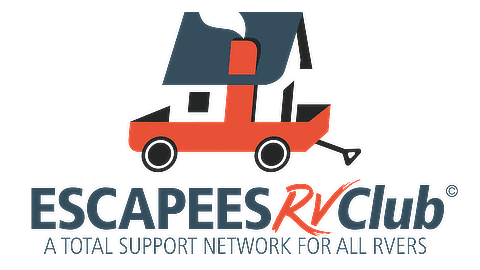



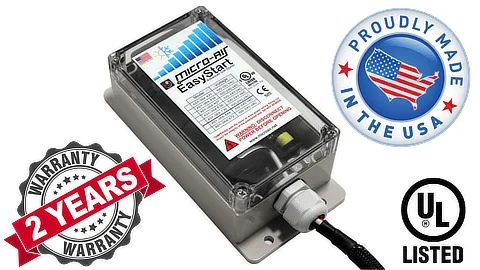
Tim H.
Sunday 19th of November 2023
My wife and I have been full timing for a little over 2 years now and we have really enjoyed the lifestyle for many of the reasons you mentioned in this article. Likewise, you hit on most of the challenges, and why we caution others considering the lifestyle to think carefully before jumping in. While it is a great way to live, it is not all vacation, all the time. And honestly, that’s really not a bad thing.
My single biggest detractor, however, is that driving -in general, but particularly in an RV- just isn’t much fun anymore. Traffic is worse than ever in many places, and drivers are generally much more impatient and much less courteous than ever. But the single biggest issue I struggle with is excessive speed- of others, that is. I’m not sure exactly when this changed (although it seems far worse post-pandemic) but it used to be that a 2 lane highway had a cruising lane and a passing lane. Somewhere along the way that changed to a fast lane (typically 5-10 mph OVER the limit) and an AUTOBAHN lane- basically as fast as your vehicle will go. And it’s not just the sports cars anymore either. Sedans, mini vans, **LARGE PICKUP TRUCKS**, semis and even other RVers blow by with amazing regularity.
Even when we tour around in our toad, it can be hard just to keep up with the flow on most freeways. Unfortunately it’s not just on freeways. Even on some of the backroads, which are generally a little more calm and relaxed, things can get ridiculous- and dangerous. Last winter I was on a scenic, rolling state route out in the desert of AZ, maintaining 55-60 on a posted 55 mph stretch and had an Amazon Prime semi pass me on a double yellow around a long- but still blind to oncoming traffic- curve. If anything had come the other way, we ALL would have been toast. Later on that same road a U-Haul passed on a double yellow, blasting his horn all the way. Again, I was not puttering along at 40 or 45 mph, I was maintaining the posted limit of 55.
Apparently there are no longer speed limits, just speed suggestions. 🙄
Sorry for the rant.
Again, the VAST majority of what I have to share about full timing is good. I have no regrets and would recommend it to anybody who’s going in with the right expectations.
But when it comes to traveling on our nations roads, the image of “cruising carefree” down the road while taking in the sights is, unfortunately, largely a myth. The reality is that much- thought to be fair not all- of RV driving requires full-on concentration, hyper vigilance and awareness, and your very best defensive driving skills- on steroids.
The destinations are often beautiful, but sadly, the journey is rarely relaxing and/or carefree,
TheRVgeeks
Sunday 19th of November 2023
Thanks for sharing, Tim, and no problem sharing a bit of a rant. We agree that the world would be a lot better off if everyone would be a little less aggressive.
Jim
Saturday 18th of November 2023
Great article. We have been on the road 24 years now. One of the things we have run into lately is that our motorhome is 23 years old. Guess what? There are many, many RV parks that will not let us in because of the age of the motorhome. So bear that in mind if you're buying a used motorhome to start your full-time adventure. But we love what we're doing and find it hard to figure out where we want to put down roots when we stop. One of the reasons that we started RVing when we were 54 was health reasons. We had good health and wanted to take advantage of that and because of that we have met so many good friends that we never would have knew existed had we kept working longer. So overall we've had a great time and met so many wonderful people. Take care and enjoy.
TheRVgeeks
Sunday 19th of November 2023
Thanks so much for sharing your experience, Jim. We don't meet many people who've been full-timing longer than we have. Props!! 🙌
Billybob
Saturday 18th of November 2023
After much thought when the salesman told me that owning an RV would make all my problems go away I was sold. The only problem is that all my problems went into the black tank, and now the dump valve is stuck.
TheRVgeeks
Sunday 19th of November 2023
Watch out for those RV salesmen! Sorry to hear about your stuck valve. Hopefully that problem WILL actually go away.
John S.
Saturday 18th of November 2023
Well written article. I think that you touched on almost everything that people considering full timing need to think about.
Over the past nine years I've discussed full timing with dozens of people. Many (including me) were considering it for a few years or longer.
But this fall I have talked to a number of former-full timers. All share the same general reason and it was basically "we have been to the places we wanted to see and we've now found where we now want to settle down."
But if you listen carefully I think that a big consideration/decision maker when you get older is all about healthcare.
At a certain age and after a health issue or two it's easier to put "no stairs" and "easy to make comfortable bed" and "bigger kitchen/fridge/living room" and "close to healthcare/hospital" into the conversation about full timing or not.
See you in Quartzsite 2024?
Take care,
John
TheRVgeeks
Sunday 19th of November 2023
Thanks for the insights, John. Sorry we won't be in Q this year, since we don't expect to have our new RV that quickly.